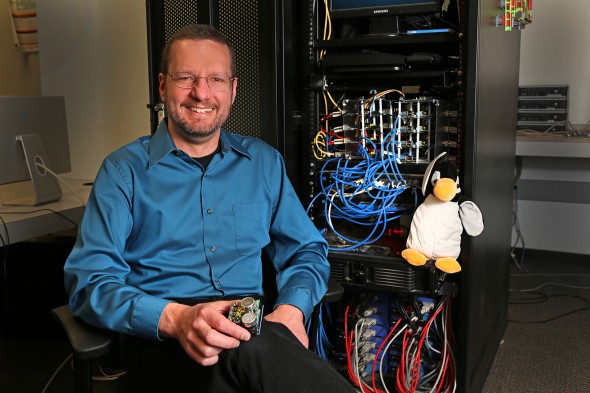Marquette professor leads development of first Wisconsin standards for computer science instruction in K-12 schools
The standards are expected to be approved by a majority of the state’s 447 school districts.
MILWAUKEE — Dr. Dennis Brylow, associate professor of math, statistics and computer science, was co-chair of the committee that developed Wisconsin’s first standards to guide K-12 school districts in their computer science instruction.
The standards, approved in late June by Tony Evers, Wisconsin Superintendent of Public Instruction, are expected to be approved by a majority of the state’s 447 school districts.
“Computer science has become a foundational skill that all students need to have access to during the formative K-12 years regardless of their occupational path,” Brylow said.
The Computer Science Standards Writing Committee, co-chaired by Brylow, developed the first template for Wisconsin schools to implement computer science academic standards for K-12 districts. It calls for computer science content and concepts to be integrated throughout the curriculum in elementary schools.
It also recommends that all middle and high school students have access to computer science instruction, including advanced courses for students who want them.
“Kids who are in school today are not going to be in traditional jobs,” Brylow said. “They aren’t going to operate a welding machine — they are going to be programming the welding robot.”
“This set of Wisconsin standards will ensure consistency in academic expectations across the districts that adopt them, and will establish a consistent way for educators in the field to connect and share resources assisting in our shared goal to ensure every student is a graduate, college and career ready,” Evers wrote in a letter to Brylow and his co-chair, Joseph Kmoch, a longtime computer science educator in southeastern Wisconsin.
Brylow’s work to establish the state standard is the latest example of Marquette’s leadership in computer and data science.
“This is another example of Marquette taking leadership in emphasizing the need for computer science earlier and earlier in students’ education,” said Richard Holz, dean of the Helen Way Klingler College of Arts and Sciences.
Other examples of Marquette’s efforts in computer and data science education:
- In April 2017, Marquette established the Center for Cyber Security Awareness and Cyber Defense to serve as the university’s primary hub for cyber security education and research. It’s the only such center in the Milwaukee metropolitan area.
- Marquette received a $1 million National Science Foundation grant in October 2016 for nearly 200 Milwaukee Public Schools teachers to receive certification to teach computer science. The teachers will begin their training later this month.
- In fall 2016, Marquette established new undergraduate majors in Data Science and Bioinformatics.
- Marquette received a $1 million NSF grant in July 2016 to help low-income, academically talented students quickly learn the skills needed to change careers into computing. It builds off a 2013 pilot program that resulted in long-term unemployed adults completing Master of Science degrees in computing.
NOTE: This press release was submitted to Urban Milwaukee and was not written by an Urban Milwaukee writer. While it is believed to be reliable, Urban Milwaukee does not guarantee its accuracy or completeness.
Mentioned in This Press Release
Recent Press Releases by Marquette University
New Marquette Law School Poll finds large majority of Wisconsin voters not yet tuned in to who is running in major 2026 elections
Oct 29th, 2025 by Marquette UniversityNo candidate has established strong position in public favorability in governor, state Supreme Court races; large majorities of voters undecided
New Marquette Law School National Survey Finds Large Majority Think Political Violence is a Big Problem, But With Sharp Partisan Differences
Oct 1st, 2025 by Marquette UniversityAmericans are overall pessimistic on reducing intense political conflict; half of those polled say heated language by leaders makes violence more likely























